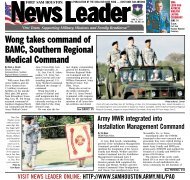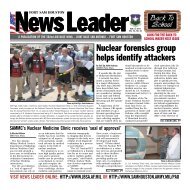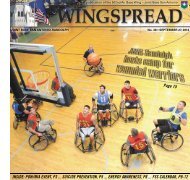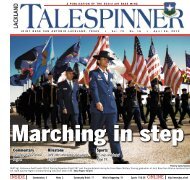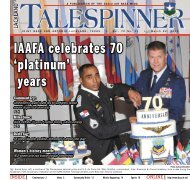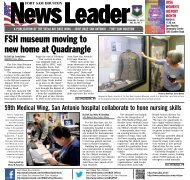Feb. 22 - San Antonio News
Feb. 22 - San Antonio News
Feb. 22 - San Antonio News
You also want an ePaper? Increase the reach of your titles
YUMPU automatically turns print PDFs into web optimized ePapers that Google loves.
news<br />
<strong>Feb</strong>ruary <strong>22</strong>, 2013 TALESPINNER PAGE 3<br />
Ne w s in Brief<br />
<strong>Feb</strong>. <strong>22</strong><br />
diamonds & denim auction<br />
Reservation deadline to attend the<br />
charity auction sponsored by the Wilford<br />
Hall Auxiliary at the Joint Base <strong>San</strong><br />
<strong>Antonio</strong>-Fort Sam Houston golf club. The<br />
benefit is open to civilians, and cost<br />
is $25 per person. For reservations or<br />
information, contact Pam Bobb at 900-<br />
2942, email resvpwha@gmail.com or<br />
visit http://wilfordhallauxiliary.com. The<br />
March 2 event, from 6-10 p.m., supports<br />
wounded warriors and deployed military<br />
members’ families.<br />
<strong>Feb</strong>. 28<br />
firearms registration deadline<br />
Failure to comply with the Joint Base<br />
<strong>San</strong> <strong>Antonio</strong> policy by the deadline will<br />
result in violators being prosecuted by<br />
security forces. The JBSA Integrated<br />
Defense Plan mandates all personnel<br />
who live in base housing, a dormitory or<br />
stay in base lodging, to register privatelyowned<br />
firearms at Pass and Registration.<br />
Additional requirements apply for those<br />
personnel utilizing JBSA recreational<br />
vehicle campgrounds.<br />
Newly-arrived personnel who live or<br />
stay in base government-owned facilities<br />
or privatized housing must register their<br />
firearms within three duty days of arrival.<br />
Firearms are registered on Air Force<br />
Form 1314, Firearms Registration. The<br />
form must be signed by the personnel’s<br />
unit commander. The commander must<br />
also verify a properly completed Department<br />
of Defense Form 2760, Qualification<br />
to Possess Firearms or Ammunition. The<br />
forms are available at http://www.epublishing.af.mil.<br />
For more information or questions,<br />
contact security forces on JBSA-Lackland<br />
at 671-9162, JBSA-Fort Sam Houston and<br />
JBSA-Camp Bullis at <strong>22</strong>1-0213 or JBSA-<br />
Randolph at 652-4365.<br />
March 8<br />
jbsa 2013 annual awards ceremony<br />
Tickets are on sale for the event, to be<br />
held at the Marriott Rivercenter Hotel in<br />
downtown <strong>San</strong> <strong>Antonio</strong>.<br />
The guest speaker will be <strong>San</strong> <strong>Antonio</strong><br />
Mayor Julian Castro. Social hour begins<br />
at 5:30 p.m., dinner starts at 6:30 p.m.<br />
For additional information or tickets,<br />
contact Master Sgt. Carteralynn Ford at<br />
671-3663 or Master Sgt. Marygail Harmon<br />
at 671-8130.<br />
Collaborative law: A team approach<br />
By E. Stephanie Hebert<br />
Legal Assistance Attorney, 802nd MSG/JA<br />
Texas encourages the peaceful resolution of disputes<br />
through alternative dispute resolution, or ADR, with special<br />
consideration given to parent-child relationships. ADR<br />
allows people to arbitrate, mediate and collaborate in an<br />
informal setting away from the courthouse. While arbitration<br />
and mediation have long been favored forms of ADR<br />
in Texas, collaborative law is gaining new ground in the<br />
U.S. and Texas.<br />
Texas was the first state to enact collaborative law statutes<br />
in 2001, and it was the third state to adopt the Uniform<br />
Collaborative Family Law Act, or UCFLA, 10 years<br />
later in 2011. The UCFLA is now codified in Chapter 15<br />
of the Texas Family Code.<br />
Collaboration is similar to mediation in that the parties<br />
participate in the negotiation process and have control<br />
over the outcome of their settlement. If the parties have<br />
not attempted mediation prior to trial, it will usually be<br />
accomplished through a court order just before trial – after<br />
the parties have spent months fighting over their separate<br />
objectives.<br />
Collaborative law, by comparison, is completely voluntary<br />
and requires that the parties and their attorneys<br />
agree, from the very beginning of the case, that they will<br />
negotiate by employing team-building techniques instead<br />
of waiting until the case is almost over – when irreparable<br />
damage has already been done, when there’s more<br />
pressure on everyone involved and emotions are at their<br />
highest.<br />
So how does the process work?<br />
Both parties, along with their lawyers, must sign a “participation<br />
agreement” and notify the court of their course<br />
of action. The parties, with their lawyers, identify joint<br />
objectives and agree upon the exchange of discovery (disclosing<br />
information essential for the case) and using experts<br />
and other professionals who will serve in a neutral<br />
capacity.<br />
Everyone involved in the process continues to work together<br />
until a settlement is reached. There are a couple<br />
of exceptions, but as long as the parties and their lawyers<br />
are working as a team, court appearances, high legal fees,<br />
discovery disputes and litigation deadlines can be reduced<br />
or altogether alleviated. Any final agreement reached by<br />
the parties will be memorialized in writing by the attorneys<br />
and presented to the court for signature.<br />
The collaborative law process can be terminated by either<br />
party at any time, with or without cause. However,<br />
once the process is terminated, both attorneys are disqualified<br />
from representing the clients any further. The parties<br />
will thus be forced to hire new lawyers, attempt settlement<br />
through another form of ADR or go to trial.<br />
Perhaps the largest obstacle to collaborative law is the<br />
requirement that each party be represented by an attorney.<br />
That means that pro se litigants are ineligible to participate<br />
in this statutory process. Remember, however, that there is<br />
nothing stopping individuals from resolving their parentchild<br />
dispute through a mediator or on their own.<br />
For more information, visit http://www.collablawtexas.<br />
com/the-collaborative-law-approach and watch two videos<br />
of couples speaking candidly about participating in the<br />
collaborative law process. The website also offers a comparison<br />
model of all ADR alternatives.<br />
Call 671-3362 to schedule an appointment with a Joint<br />
Base <strong>San</strong> <strong>Antonio</strong>-Lackland legal assistance attorney for<br />
answers to questions about collaborative law, or other ADR<br />
alternatives.




